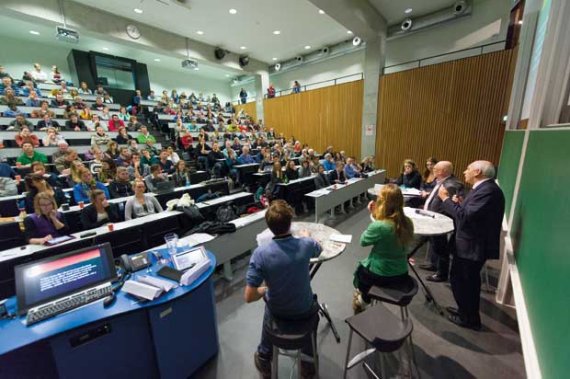How can we produce more food with fewer resources so as to feed 7 billion people? This was the question in focus during the debate on food security with Aalt Dijkhuizen, several professors and a roomful of students on 11 December in the Forum. The debate was a follow-up to Aalt Dijkhuizen’s statements in Dutch newspaper Trouw in September, in favour of a global intensification of agriculture. At the time, staff and students from Wageningen UR expressed strong opposition to the idea. Three months later, however, feelings do not seem to be running so high, because there was hardly any heated discussion during this debate. A number of different points of view were expressed over issues such as whether small-scale or large-scale agriculture is the more sustainable, and the advantages and disadvantages of organic and conventional farming. One student could not believe that organic farming is worse for biodiversity than conventional farming, after professor Imke de Boer had explained that the organic farming sector needs 40 percent more land to produce the same yield. ‘Turn your conviction into a research question,’ Professor Lijbert Brussaard advised him. ‘Find out under which conditions food production and ecosystems are most efficient.’ Lower meat consumption Brussaard set the tone of the gathering. Scientists have their convictions and values, too, he said, and they use them to formulate research questions. The results they get give politicians and citizens a more solid basis for forming opinions and making decisions. They are the ones who will decide whether animal welfare in the livestock sector is more important than environmental conservation, and whether we need to try to reduce meat consumption and waste. The other speakers emphasized that Wageningen UR should not opt for one production system for the world food supply, but that the best agriculture depends on the conditions in each country or region. Nobody disputed the idea that agriculture in general needs to become more intensive – the claim with which Dijkhuizen kicked off the discussion. On the other hand, nobody repeated Dijkhuizen’s suggestion that the Dutch production model is an example for the rest of the world. Rector Martin Kropff succeeded in pulling the various contributions together and argued for integral research questions on which technical and social sciences collaborate, proposing a new multidisciplinary Wageningen degree programme: Food Security.
Do intensify, but not the Dutch way
Students and researchers respond to Dijkhuizen's controversial interview. 'Best farming system depends on local conditions.'

